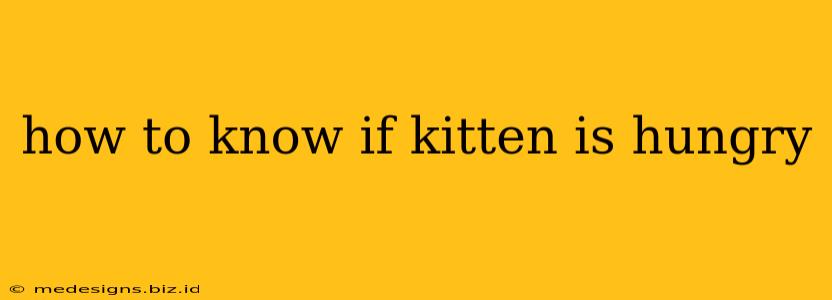Bringing a new kitten into your home is an exciting experience! But one of the first things you'll need to learn is how to recognize when your tiny fluffball is hungry. Understanding your kitten's hunger cues is crucial for their health and development. A well-fed kitten is a happy and healthy kitten!
Understanding Kitten Hunger Cues: Beyond Just Meowing
While meowing is a sign, it's not the only sign your kitten is hungry. Kittens, especially young ones, communicate their needs in various ways. Let's explore the key indicators:
Vocalizations:
- Meowing: A persistent, insistent meow, especially if accompanied by other signs, is a strong indicator of hunger. A hungry kitten's meow often has a different tone than a playful or attention-seeking meow. It tends to be more demanding and frequent.
- Chirping or Squeaking: Very young kittens might chirp or squeak softly when they're hungry, especially if they're still learning to vocalize fully.
Behavioral Cues:
- Active Searching: A hungry kitten will actively search for food, sniffing around their food bowl, or even exploring other areas of the house in search of something to eat.
- Excessive Crying: Persistent crying, especially if it's not associated with other needs like needing the litter box, could indicate hunger.
- Restlessness: A restless kitten pacing around or constantly moving might be expressing hunger. They might also rub against your legs or other objects more than usual.
- Nibbling at Anything: A desperate kitten might try to nibble on things that aren't food, like blankets, toys, or even your fingers. This is usually a sign of extreme hunger.
- Suckling: Even weaned kittens may sometimes revert to suckling behaviors when hungry, particularly if they were separated from their mother too early. This can involve sucking on blankets or fingers.
Physical Signs:
- A Hollow Abdomen: Gently feeling your kitten's abdomen can give you an idea of whether they are full or hungry. A noticeably sunken or hollow belly is a clear sign that they need to eat. However, remember to be gentle!
- Low Energy Levels: While kittens are naturally playful, a significant drop in energy levels and a general lethargy could point towards hunger. This is especially true if accompanied by other hunger cues.
Feeding Schedule and Portion Sizes: Setting Your Kitten Up for Success
Providing regular meals is essential for your kitten's well-being. The frequency depends on their age:
- Newborn Kittens (0-4 weeks): Need to be fed every 2-3 hours.
- Young Kittens (4-8 weeks): Need to be fed every 3-4 hours.
- Older Kittens (8+ weeks): Can be fed 3-4 times a day.
Follow the feeding guidelines on your kitten's food packaging for appropriate portion sizes. Remember, it’s always better to slightly underestimate portions and offer more later if needed, rather than overfeeding.
When to Consult a Veterinarian
If you're concerned that your kitten is consistently hungry despite seemingly adequate feeding, or if they exhibit any other unusual behaviors or health issues, it's vital to consult a veterinarian. They can help rule out any underlying medical conditions that might be causing increased appetite or affecting their digestion.
By paying close attention to your kitten's vocalizations, behavior, and physical condition, you can effectively determine when they're hungry and ensure they receive the proper nutrition to thrive. Remember, a well-fed kitten is a happy and healthy kitten!
